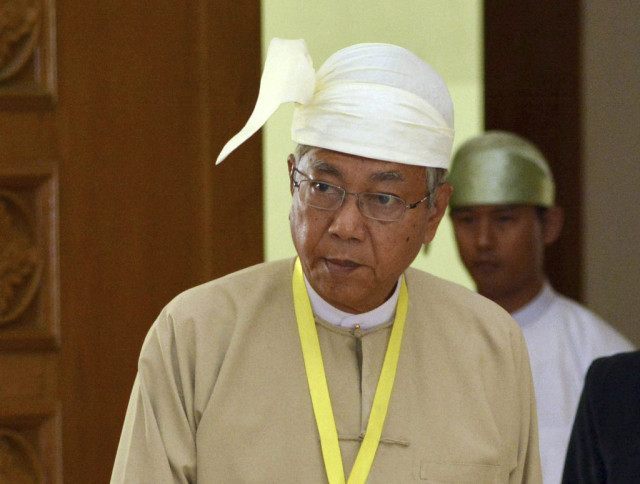NAYPYITAW, Myanmar (AP) — Myanmar’s president-elect on Tuesday proposed an 18-member Cabinet that will include party leader Aung San Suu Kyi, the former dissident who for decades had campaigned for a democratically elected government to replace the country’s military junta.
President-elect Htin Kyaw submitted the names to the parliament for a formal review and approval by legislators on Wednesday, after which the Cabinet positions of the ministers will be decided.
Notable, and top on the list, is Suu Kyi, who was not able to become president because of a constitutional block, even though she led her party to a landslide win in general elections last November.
It was widely rumored that Suu Kyi will become the foreign minister, but that’s far from certain because if she were to take that post she would have to give up her parliament seat and end party activities.
“I doubt that Aung San Suu Kyi would take the position of the foreign minister,” said Toe Kyaw Hlaign, a political analyst. “Also, working as a foreign minister requires a lot of time traveling around the world. She will have to do a lot of international relations and overseas trips, and she won’t have the time to exercise control over the government,” he told The Associated Press.
Suu Kyi has said in the past that she will be “above the president” and indirectly govern the country from behind the scenes.
Still, Suu Kyi’s entry into the government is a remarkable turn of fortunes not only for the Nobel Peace laureate but also for the country, which had been under an iron-fisted military rule since 1962. For decades the junta kept Myanmar in isolation and economic stagnation while refusing to listen to international counsel or homegrown demands for democracy.
Suu Kyi came to prominence in 1988 when popular protests were building up. The junta simply crushed the protests that had turned into anti-government riots, killing thousands of people and placing Suu Kyi under house arrest in 1989.
The general did call elections in 1990 but refused to hand over power when Suu Kyi’s National League for Democracy party won overwhelmingly. Suu Kyi was awarded the Nobel Peace Prize a year later.
As Myanmar continued to wallow under military rule, Suu Kyi was released and re-arrested several times. The junta finally started loosening its grip on power in 2010, allowing elections that were won by a military-allied party after the NLD boycotted the polls as unfair.
After more reforms, another general election was held on Nov. 8 that was swept by the NLD, a reflection of Suu Kyi’s widespread public support. The constitutional clause that denied her the presidency excludes anyone from the job who has a foreign spouse or children. Suu Kyi’s two sons are British, as was her late husband. The clause is widely seen as having been written by the military with Suu Kyi in mind.
Still, the democracy that Suu Kyi and her colleagues are building now is not a complete package. The military has reserved for itself 25 percent of the seats in parliament, ensuring no government, current or future, can amend the constitution without its approval.
Also, it ensured that one of the two vice-presidents of Htin Kyaw is a former military man, Myint Swe, who is seen as a close ally of former junta leader Than Shwe. Myint Swe also remains on a U.S. Treasury Department blacklist that bars American companies from doing business with several tycoons and senior military figures connected with the former junta.

COMMENTS
Please let us know if you're having issues with commenting.